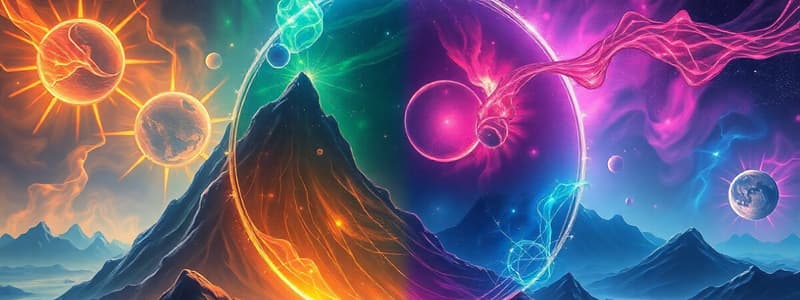Podcast
Questions and Answers
What characteristic defines solids compared to liquids and gases?
What characteristic defines solids compared to liquids and gases?
- Solids have a definite shape and volume. (correct)
- Solids can take the shape of their container.
- Solids have no definite shape or volume.
- Solids' particles move freely.
Which phase change occurs when a liquid becomes a gas?
Which phase change occurs when a liquid becomes a gas?
- Evaporation (correct)
- Sublimation
- Condensation
- Melting
What happens during condensation?
What happens during condensation?
- A gas becomes a solid.
- A solid turns into a gas.
- A liquid turns into a solid.
- A gas turns into a liquid. (correct)
What is the process called when a solid changes directly into a gas without becoming a liquid?
What is the process called when a solid changes directly into a gas without becoming a liquid?
Which of the following substances is an example of a gas?
Which of the following substances is an example of a gas?
Flashcards are hidden until you start studying
Study Notes
States of Matter
- Solids have a definite shape and volume. Their particles are tightly packed and only vibrate. Examples include ice and rock.
- Liquids have a definite volume but take the shape of their container. Their particles are close together but can move around each other. Examples include water and juice.
- Gases have no definite shape or volume and fill any container. Their particles are far apart and move freely. Examples include air and steam.
Phase Changes
- Condensation occurs when a gas cools down and turns into a liquid. An example is water droplets forming on a cold glass.
- Evaporation occurs when a liquid heats up and turns into a gas. An example is water drying up on a sunny day.
- Sublimation occurs when a solid turns directly into a gas without becoming a liquid. An example is dry ice (solid carbon dioxide) turning into gas.
- Melting occurs when a solid heats up and turns into a liquid. An example is ice melting into water.
- Freezing occurs when a liquid cools down and turns into a solid. An example is water turning into ice.
Studying That Suits You
Use AI to generate personalized quizzes and flashcards to suit your learning preferences.



